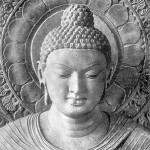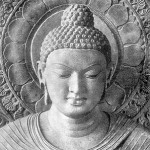On August 8th, we had the pleasure of being students of John Wentz for an hour. The goal of John’s discussion was, as he stated, to stretch us in ways we may not have experienced in the past. Well I certainly found his talk to stretch my mind and consider the topic of Gratitude from a new perspective.
I highly recommend you click this link to listen to the audio recording of Monday’s night talk in order to listen to the entire message.
(volume is slightly low; can start 5:00 mins in to bypass some opening intros)
Here are my notes along with some thoughts on John’s talk.
“All faults spring from a single source.” Self-centeredness.
There are many ways to combat this reality. We need to develop balance & perspective. One great approach is to meditate on gratitude on all beings. This will develop a more skillful perspective away from self-centeredness.
John pointed out how in Tibetan culture one’s mother is the focus of great gratitude. We owe so much to our mother from the birthing process all the way up to how she loved and cared for us as a child. As a result of this, mothers are looked upon with great respect and understanding.
At the onset of our session, each of us identified what we are grateful for. Do we take these things for granted? Do you think you deserve these things? What have you done for your family lately? Do you think you’re entitled to good fortune? Many of us get conditioned or lulled into this sense of self-entitlement. John noted that this is not based in actual reality. It’s a conditioned mind-set.
 A worthwhile challenge is to question this mind-set and to recognize the precious life we have and the positive things in our life. These are gifts from other sentient beings. John is suggesting we change the lens through which we view the world; we drop the I and the self-entitlement and instead train our mind through our practice. Specifically, in this case, a practice focused away from self to awareness of all that we have to be grateful for. To develop a recognition of all the dependencies that exist for things which we may have taken for granted in the past. We are fortunate to have a sangha in our area to practice. We are fortunate to have a meeting place for our sangha, fortunate for the founders of BSBC Sangha, and for those who have continued to “carry the torch” and on and on will this awareness grow. But, as with everything in life, it requires daily practice and constant re-enforcement.
A worthwhile challenge is to question this mind-set and to recognize the precious life we have and the positive things in our life. These are gifts from other sentient beings. John is suggesting we change the lens through which we view the world; we drop the I and the self-entitlement and instead train our mind through our practice. Specifically, in this case, a practice focused away from self to awareness of all that we have to be grateful for. To develop a recognition of all the dependencies that exist for things which we may have taken for granted in the past. We are fortunate to have a sangha in our area to practice. We are fortunate to have a meeting place for our sangha, fortunate for the founders of BSBC Sangha, and for those who have continued to “carry the torch” and on and on will this awareness grow. But, as with everything in life, it requires daily practice and constant re-enforcement.
Midway through our discussion, John quoted Shantideva: “The outcome of suffering is better than the outcome of happiness.” This sounds like a contradiction to all conventional wisdom but if we investigate a little deeper we’ll begin to understand what Shantideva is saying. In hard times, we buckle down and are forced to really challenge ourselves. During good times, we tend to be more on cruise control and not really learning or growing.
As I stated above, John asked each of us to share what we were grateful for. One person replied that they were grateful for challenges. John pointed out that in order to perform at a level of excellence, we have to constantly challenge ourselves. So, the challenges of suffering and what we learn by studying the source of suffering and practicing the dharma is what will bring about the greatest growth and reward.
To build on this notion of pushing ourselves, the hope is that we will continuously look for areas that will challenge us. Be it craving, egoism, or relationships, the idea is that we will improve our awareness and develop skill in how we handle ourselves, with the goal being to one day call our enemies our friends. It goes back to what was discussed earlier with gratitude and meditating on others to get us out of thinking about ourself. With practice, we will develop resilience and an ability to grow and stretch our mind.




